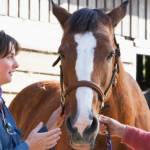Improving Horse Health Through Strategic Vaccination

According to recent surveys, many horse owners continue to decline routine, recommended vaccinations for various reasons such as perceived safety issues, concerns regarding adverse effects, and cost. Refusal to vaccinate, however, puts horses at risk for disease.
Considering the economic impact of the equine industry worldwide, minimizing infectious disease and improving equine welfare continue to be important topics of conversation among professionals. During the French Equine Veterinarians Association* conference, veterinarians discussed strategies to prevent infection through vaccination. The panel sought to answer three main questions:
1. What are the usefulness and efficacy of emergency vaccination?
2. What is the consequence of using/mixing vaccines from different brands and manufacturers?
3. What is the impact of vaccination lapse or shortage on protective immunity?
Emergency vaccination could be indicated in the face of an outbreak, depending on the infectious agent in question. Vaccination was highly effective during Australia’s equine influenza outbreak in 2007 that ultimately affected an estimated 170,000 horses.
“One key strategy involved in instituting their emergency vaccination plan involved creating vaccination “buffer” zones in which all horses in those areas were vaccinated. While not all horses vaccinated inside those buffer zones were fully protected, clinical signs of influenza were typically milder than unvaccinated horses,” explained Laura Petroski, B.V.M.S., staff veterinarian for Kentucky Equine Research (KER).
These buffer zones effectively limited the spread of disease in both speed and distance as horses beyond the buffer zones were not exposed to the virus. Protection was additionally heightened when emergency vaccination was used in conjunction with biosecurity protocols.
In terms of mixing vaccinations from different manufacturers, veterinarians noted that horses would rarely be vaccinated using the same type (intranasal versus intramuscular) or brand of vaccine throughout their life. Unfortunately, limited data exist to clearly answer the question of whether type of vaccine impacts protection. That said, some studies involving the flu vaccine show that different vaccines are compatible, and horses appear protected even after mixing vaccines.
Finally, experts discussed the impact of vaccination gaps, which could occur during vaccine shortages or failure to follow the recommended vaccination schedule. Again, using the case of equine influenza, the exact impact of lapses will likely vary on a case-by–case basis. Further, the experts noted that “breakdown in the vaccination schedule should be considered as potentially problematic, both at the individual and herd levels.”
“In addition to these important topics, owners need to appreciate that each individual horse may respond differently to the same vaccine. To maximize a horse’s response to vaccination, consider supplementing horses with a proven omega-3 fatty acid supplement, such as EO•3,” advised Petroski.
*Paillot, R., C. Marcillaud Pitel, X. D’Ablon, et al. 2017. Equine vaccines: How, when and why? Report of the Vaccinology Session, French Equine Veterinarians Association, 2016, Reims. Vaccines (Basel). 5(4):46.








